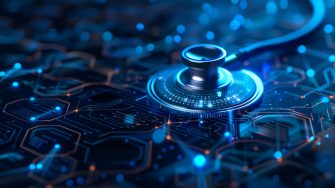Dr ChatGPT: How AI could help us live longer
A UNSW health and engineering expert says using artificial intelligence and machine learning on medical data could be key to helping us all live longer.
A UNSW health and engineering expert says using artificial intelligence and machine learning on medical data could be key to helping us all live longer.

That’s the opinion of Beena Ahmed, an Associate Professor at UNSW Sydney, who is an expert in applying machine learning and remote monitoring in healthcare and therapeutic settings.
She says it may be possible for future AI systems to predict a person’s potential health issues if a large amount of data has been collected and can be analysed efficiently, the same way ChatGPT does with other information.
“Medical research is showing that what we do in our 20s and 30s and 40s has a big influence on your outcomes in later life,” A/Prof. Ahmed says, “so it’s becoming ever more important that we monitor our health at every stage.”
“We are getting better at collecting data like that, but we are not analysing that data at speed.”
A/Prof. Ahmed says there is currently no way of analysing massive amounts of medical data over a long period, and the immense power of AI is not being used to help health professionals interpret such information.
Her own work has pioneered the use of machine learning to detect errors in disordered speech and predict the risk of dementia from speech.
She has also worked on novel algorithms to measure how complicated the sleep electroencephalogram (a recording of your brain activity while you sleep) is and detect sleep disorders such as insomnia, assisting clinicians with diagnosis.
She believes there will be even more ways for medical experts to collect data from the population in the future.
“If you applied the same sort of models used in that sort of artificial intelligence and machine learning to medical information, then you may be able to predict some major health issues for an individual person based on their readings at any given time,” she says.
“So, for example, you might be able to assess that someone has a much greater chance of having a heart attack in the near future – and then be able to treat them and prevent the heart attack from happening.”
A/Prof. Ahmed acknowledges that one of the big challenges when it comes to data collection and analysis anywhere, let alone medicine and health, is privacy.
“I think this is something the government or another autonomous body needs to take control of and implement guidelines that everyone must follow.
“At the moment the data belongs to whoever is collecting it, and that is very often a tech company who can then just sell that information to the highest bidder.
“If governments are really serious about ensuring their people live healthier lives longer, we need to fast-track that data protection issue.
“Without that, there’s no way you can develop systems that can actually be properly implemented over the long-term to ensure that people stay healthy.”
As Australia’s best engineering faculty turns 75, there are just as many reasons why we’ve earned that title. Discover new stories weekly, celebrating the successes that have enabled progress for all.